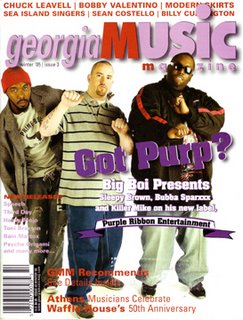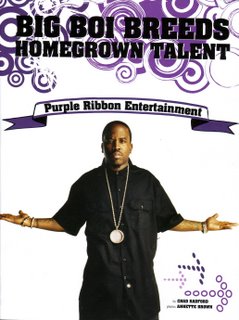With Purple Ribbon Entertainment, Big Boi breeds homegrown talent
 During the weeks and months leading up to the Sept. 23, 2003 release date for OutKast’s fifth and most highly anticipated recording, Speaker Boxxx/The Love Below, the music press’ poison pins were primed. The group’s principle players, Andre 3000 (né Andre Benjamin) and Big Boi (Antwan Patton) went the Kiss route with the new album(s) simultaneously offering two separate records under one package, to explore their artistic differences. In many minds this budding division of Atlanta’s six-time GRAMMY Award winning hip-hop duo meant the future of the group was in doubt. But over two years down the road OutKast’s name still looms large on the hip-hop horizon.
During the weeks and months leading up to the Sept. 23, 2003 release date for OutKast’s fifth and most highly anticipated recording, Speaker Boxxx/The Love Below, the music press’ poison pins were primed. The group’s principle players, Andre 3000 (né Andre Benjamin) and Big Boi (Antwan Patton) went the Kiss route with the new album(s) simultaneously offering two separate records under one package, to explore their artistic differences. In many minds this budding division of Atlanta’s six-time GRAMMY Award winning hip-hop duo meant the future of the group was in doubt. But over two years down the road OutKast’s name still looms large on the hip-hop horizon.Was the media making a mountain out of a molehill over the artistic parting of a pair whose previous work together, including Aquemini and Stankonia received critical acclaim for balancing brainy beats and dirrrty funk?
“We needed it and appreciate that y’all did that for us, Big Boi muses over a speaker phone while getting his hair cut in the Purple Ribbon offices in preparation for a photo shoot. "The music was sounding good, but we needed controversy to sell it,” he continues. The group had largely steered clear of any real controversy, save for a troublesome ‘98 single "Rosa Parks." The song brandishes the chorus "Ah-ha, hush that fuss. Everybody move to the back of the bus," which earned OutKast a law suit from the now deceased civil rights figure after whom the song takes its name.
“It's like this,” Big Boi adds. “We didn’t shoot nobody. We didn’t rape nobody and nobody went to jail. All we had was Rosa Parks goin’ on!”
 Regaining composure Big sets the record straight. “We’re serious about the music. We’re not breaking up, but there is a form of evolution happening. Dre has graduated to a new level and is moving on to something else. What we do together is all about the music and if the music ain’t right we ain’t doin’ it.”
Regaining composure Big sets the record straight. “We’re serious about the music. We’re not breaking up, but there is a form of evolution happening. Dre has graduated to a new level and is moving on to something else. What we do together is all about the music and if the music ain’t right we ain’t doin’ it.”While Andre has been gallivanting around Hollywood, getting face time in films like Be Cool and Four Brothers, Big Boi’s gaze remains fixed on Atlanta. Heading up a Virgin Records subsidiary label, Purple Ribbon Entertainment, and fostering a stable of new comers and notorious Atlanta-based artists, Big Boi is spearheading a renaissance in the dirty South. Purple Ribbon is the successor of OutKast’s Aquemini Records, which was run by both Dre and Big Boi; now run solely by Big Boi. And with Purple Ribbon he’s giving music made by ATLiens for ATLiens a platform to invade the rest of the world as well.

The first video from the label is for the single “I’m On It” by the Purple Ribbon All-Stars, featuring Big Boi, Killer Mike, C-Bone and Rock D spitting a hodgepodge of lyrical vignettes. Gone is the offbeat geek funk akin to Andre’s presence. In its place rolls a clunky cadence that stutters over various scenes of barbeques, football games and an army of buxom babes milling about in tiny t-shirts emblazoned with the burning question, “Got Purp?”
“I’m On It” thunders to life with motorized, rhythmic workouts but the angular and minimal arrangements of the song are hardly indicative of the label’s direction. The song also appears on Purple Ribbon’s first release, a compilation titled Got Purp Vol 2 – the follow-up to a low-key mix CD Big released in December ‘04, offers a preview of the label’s eclectic stable of artists. The very name Purple Ribbon alludes to the highest honor awarded to the blue pit bull terriers he breeds and sells through Pitfall Kennels, a family business that’s running ten years strong.
Sleepy Brown of the Organized Noize production team, good ‘ol boy rapper Bubba Sparxxx and grimy street scholar Killer Mike are amongst Purple Ribbon’s higher-profile acts. But lesser known locals, including young soul slingers Janelle Monae and Scar, and decadent rap outfit Konkrete bring fresh faces to the label. Big Boi’s only prerequisite: the music is funk based. “It’s got to be funky!” Big Boi declares. “We make music by experimenting with grooves, melodies, patterns, so when you hear it, you’re like ‘wooooo shit!’” he crows before likening the label’s sound to an act of oral sex. “You know what I’m sayin’?!?”
Purple Ribbon’s first artist release is Bubba Sparxxx’s third recording, The Charm. “As in the third time is…” Sparxxx elaborates. “We’ve taken some chances with this one, bringing in some different elements, but it’s all still rooted in hip-hop,” he adds. “With my last album there was a blue grass element. With this one we did some real punk rock [or as he says ‘puh rawk’] type things.”
Sparxxx’s cut on Got Purp 2, titled “Claremont Lounge” is a murky anthem set in the scene of Atlanta’s sleaziest of sleazy night spots, accompanied by Coool Breeeze and most notably OutKast protégé Killer Mike. As the fast and fluid voice behind OutKast’s single “The Whole World,” Killer Mike was once declared by Big Boi as “OutKast’s only son.” His balance of slang and social consciousness embodies the engine that drives Purple Ribbon, which landed him a spot in the Purple Ribbon All-Stars. But with Sparxxx, he’s taken the tone down a notch to set off a tempo that’s slow and low.
Sleepy Brown is the son of vocalist Jimmy Brown who scored the minor hit, “Dazz” in the ‘70s, fronting the Atlanta jazz/funk ensemble Brick, and producer of such hip-hop and R&B staples TLC, En Vogue and Ludacris. His debut release, Mr. Brown moves toward a more traditional soul sound. “I’m just trying to take people back to a time when there was still good music,” he explains. “I love that Atlanta has crunk, I get crunk too. But my sound is coming from the way I was brought up.”
Sighting influences as far ranging as Rodgers & Hammersein to the Jackson 5, Janelle Monae’s sound is a futuristic whirr that balances soul, sci-fi and Broadway. Her tentatively titled first release, Metropolis is based on a screenplay she’s writing about a cyborg woman who falls in love with a human. “It’s a futuristic musical,” she explains. “It’s paralleled to things like slavery, interracial dating and how gays are viewed as being weird because they love who they love.”
Scar’s debut, Scarred 4 Life is a more down-to-Earth offering. His sound builds around smooth vocalizations that evoke the soulful crooning of everyone from Marvin Gaye to Babyface to Tony! Toni Toné crooner Raphael Sadiq. “People always meet me and say ‘I thought you were a rapper,’” he laughs. After graduating from high school in Oxford, Scar was involved in a car accident that took the life of his brother and his cousin, and left a profound scar across his face. “Every scar tells a story,” he explains “When you see me you won’t forget that scar and when you hear me, you now the story behind it.”
Konkrete’s as yet untitled debut is also in the works. The group revels in indulgent vulgarity, depravity, and decadence with a sluggish and thuggish beat. Rounded out by emcees Cory “Black-Owned C-Bone” Andrews, Nathaniel “Supa Nate” Elder and James “Lil’ Brotha” Patton (A.K.A. Big Boi’s younger sibling), Konkrete raps about the harsh realities of everyday life with unapologetic fervor. The group’s contributions to Got Purp. 2, “Lovin This” and “Sh*t Ya Draws” are a slow crawl of Southern lingo and beats that ooze like molasses from the speakers.
As for Big Boi, plans remain for a solo release on Purple Ribbon, but not until sometime in 2007. “As soon as I finish up my contractual obligations with Jive Records it’s gonna be like Michael Jordan playing for the Bulls and owning the Bulls,” he laughs. “I have a bout 18 to 20 tracks ready. It’s a lot, but I like to slow cook ‘em like neck bones.”
In the midst of it all Outkast’s imminent return arrives with the soundtrack to director Bryan Barber’s Idlewild (HBO), set to be released Dec. 6, which also stars both Dre and Big Boi. The film is a musical set in the South during the prohibition era, where modern hip-hop fodder i.e. wine women and song, are just as relevant in 1930’s as they are today. Talks of yet another OutKast record next year have been quashed. “We don’t want to rush anything,” Big Boi adds. “We want to see how the audience reacts to the soundtrack before we do the next one.”
--Chad Radford
(Published by Georgia Music Magazine, December 1, 2005).


<< Home